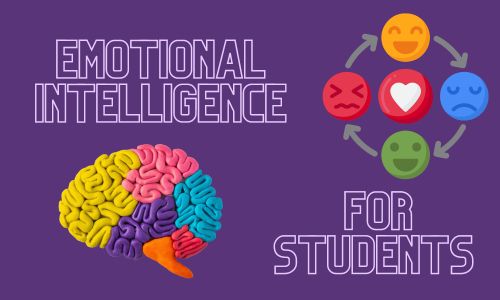In today’s fast-paced academic landscape, students are often faced with challenges that go beyond textbooks and tests. While cognitive intelligence lays the foundation for academic success, there’s another form of intelligence that plays a pivotal role in a student’s overall well-being and achievement: Emotional Intelligence (EI). For high school and college students, developing EI can be the key to unlocking personal growth, enhancing interpersonal relationships, and navigating the intricate dynamics of academic life. Let’s delve deeper into the transformative power of Emotional Intelligence and its profound impact on students’ journeys.
Understanding Emotional Intelligence (EI)
Emotional Intelligence, often abbreviated as EI or EQ (Emotional Quotient), is more than just a modern buzzword. It encompasses a range of skills that, while intangible, have tangible effects on our daily interactions and personal growth. Before diving into its intricacies, let’s define what EI truly means for students.
- Emotional Intelligence refers to the ability to recognize, understand, manage, and effectively express one’s own emotions, as well as the ability to engage and navigate successfully with the emotions of others.
- It’s not just about being “emotionally aware”; it’s about using that awareness to foster personal and interpersonal growth.
Why is EI Crucial for High School and College Students?
The teenage and early adult years are a whirlwind of change, exploration, and self-discovery. High school and college life, with its blend of academic, social, and personal challenges, makes EI not just beneficial but essential. Here’s why Emotional Intelligence stands out as a cornerstone skill during these transformative years.
- Transition Challenges: High school and college are periods of significant transition. Understanding emotions can help navigate these changes more smoothly.
- Academic Pressure: Managing stress and anxiety through emotional awareness can lead to better academic outcomes.
- Social Dynamics: Building and maintaining relationships, understanding social cues, and effective communication are all enhanced by EI.
Strategies to Develop Emotional Intelligence
While some individuals might naturally exhibit higher levels of EI, it’s a skill set that can be nurtured and developed with the right strategies. Whether you’re a student, educator, or parent, understanding these strategies can pave the way for enhanced emotional growth and understanding. Let’s explore some effective approaches.
- Self-Reflection: Encourage students to take time to reflect on their emotions. Journaling can be a powerful tool for this.
- Empathy Building: Role-playing and group discussions can help students understand and respect diverse perspectives.
- Mindfulness Practices: Techniques like meditation and deep breathing can enhance emotional awareness and regulation.
- Feedback Acceptance: Constructive criticism, when taken positively, can be a growth tool, teaching students to handle feedback without becoming defensive.
- Conflict Resolution: Equip students with tools to handle conflicts maturely, focusing on understanding rather than reacting.
The Long-Term Benefits of Emotional Intelligence
The ripple effects of a strong Emotional Intelligence extend far beyond the classroom or campus. From personal well-being to professional success, the benefits of honing EI are manifold. Let’s delve into the lasting impact of EI on various facets of life.
- Career Success: Beyond academics, EI plays a pivotal role in career advancement, leadership, and teamwork.
- Mental Well-being: Emotional awareness and regulation contribute to better mental health, resilience, and overall well-being.
- Relationship Building: Strong EI skills foster deeper, more meaningful personal and professional relationships.
Conclusion: The Journey of Emotional Growth
Emotional Intelligence isn’t a destination but a continuous journey. As students transition from high school to college and beyond, the principles of EI remain a guiding force. Before we wrap up, let’s reflect on the overarching significance of this emotional journey. Emotional Intelligence isn’t just a buzzword; it’s a foundational skill that can profoundly impact a student’s personal and academic journey. By integrating EI development into high school and college experiences, we pave the way for well-rounded, emotionally-aware individuals ready to tackle future challenges.





